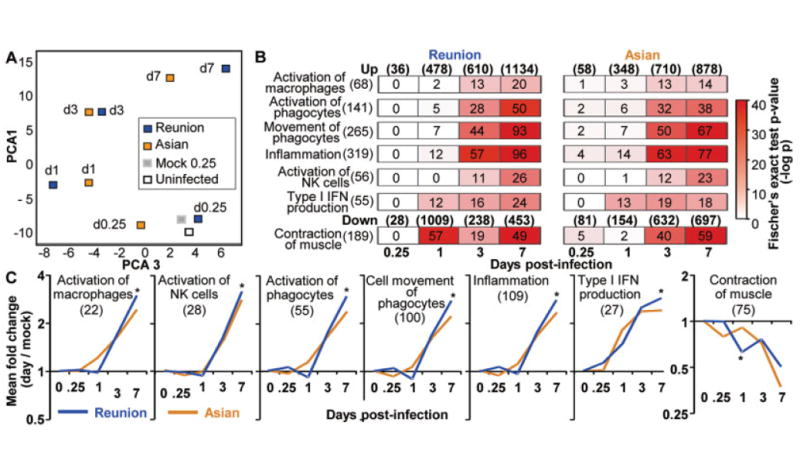Gene profiling of Chikungunya virus arthritis in a mouse model reveals significant overlap with rheumatoid arthritis.
Chikungunya virus (CHIKV) is a mosquito-borne alphavirus that causes a chronic debilitating polyarthralgia/polyarthritis, for which current treatments are often inadequate. To assess whether new drugs being developed for rheumatoid arthritis (RA) might find utility in the treatment of alphaviral arthritides, we sought to determine whether the inflammatory gene expression signature of CHIKV arthritis shows any similarities with RA or collagen-induced arthritis (CIA), a mouse model of RA. Using a recently developed animal model of CHIKV arthritis in adult wild-type mice, we generated a consensus CHIKV arthritis gene expression signature, which was used to interrogate publicly available microarray studies of RA and CIA. Pathway analyses were then performed using the overlapping gene signatures. Gene set enrichment analysis showed that there was a highly significant overlap in the differentially expressed genes in the CHIKV arthritis model and in RA. This concordance also increased with the severity of RA, as measured by the inflammation score. A highly significant overlap was also seen between CHIKV arthritis and CIA. Pathway analysis revealed that the overlap between these arthritides was spread over a range of different inflammatory processes. Involvement of T cells and interferon-γ (IFNγ) in CHIKV arthritis was confirmed in studies of MHCII-deficient mice and IFNγ-deficient mice, respectively. These results suggest that RA, a chronic autoimmune arthritis, and CHIKV disease, usually a self-limiting viral arthropathy, share multiple inflammatory processes. New drugs and biologic therapies being developed for RA may thus find application in the treatment of alphaviral arthritides.
Authors
Helder I Nakaya; Joy Gardner; Yee-Suan Poo; Lee Major; Bali Pulendran; Andreas Suhrbier
External link
Publication Year
Publication Journal
Associeted Project
Systems Immunology of Human Diseases
Lista de serviços
-
As antisense RNA gets intronic.As antisense RNA gets intronic.
-
Androgen responsive intronic non-coding RNAs.Androgen responsive intronic non-coding RNAs.
-
Conserved tissue expression signatures of intronic noncoding RNAs transcribed from human and mouse loci.Conserved tissue expression signatures of intronic noncoding RNAs transcribed from human and mouse loci.
-
The intronic long noncoding RNA ANRASSF1 recruits PRC2 to the RASSF1A promoter, reducing the expression of RASSF1A and increasing cell proliferation.The intronic long noncoding RNA ANRASSF1 recruits PRC2 to the RASSF1A promoter, reducing the expression of RASSF1A and increasing cell proliferation.
-
Antisense intronic non-coding RNA levels correlate to the degree of tumor differentiation in prostate cancer.Antisense intronic non-coding RNA levels correlate to the degree of tumor differentiation in prostate cancer.
-
Insight Into the Long Noncoding RNA and mRNA Coexpression Profile in the Human Blood Transcriptome Upon Leishmania infantum Infection.Insight Into the Long Noncoding RNA and mRNA Coexpression Profile in the Human Blood Transcriptome Upon Leishmania infantum Infection.
-
Long non-coding RNAs associated with infection and vaccine-induced immunityLong non-coding RNAs associated with infection and vaccine-induced immunity
-
Comparative transcriptomic analysis of long noncoding RNAs in Leishmania-infected human macrophagesComparative transcriptomic analysis of long noncoding RNAs in Leishmania-infected human macrophages
-
SARS-CoV-2 Selectively Induces the Expression of Unproductive Splicing Isoforms of Interferon, Class I MHC, and Splicing Machinery Genes.SARS-CoV-2 Selectively Induces the Expression of Unproductive Splicing Isoforms of Interferon, Class I MHC, and Splicing Machinery Genes.

